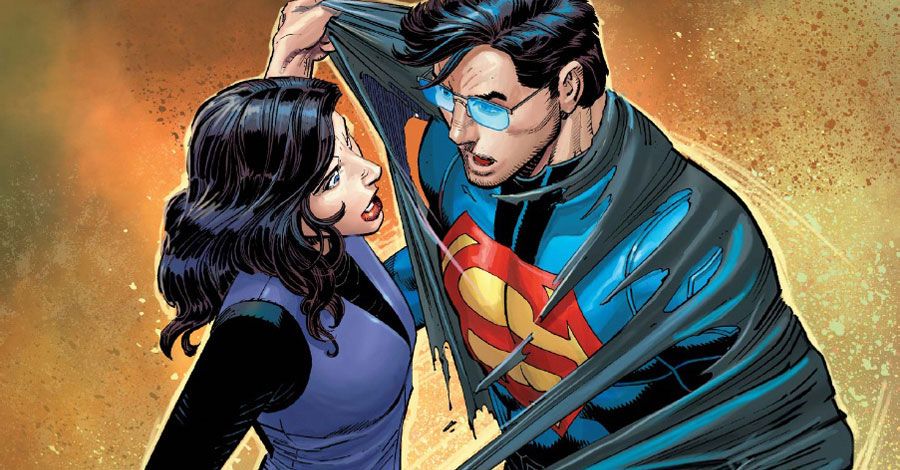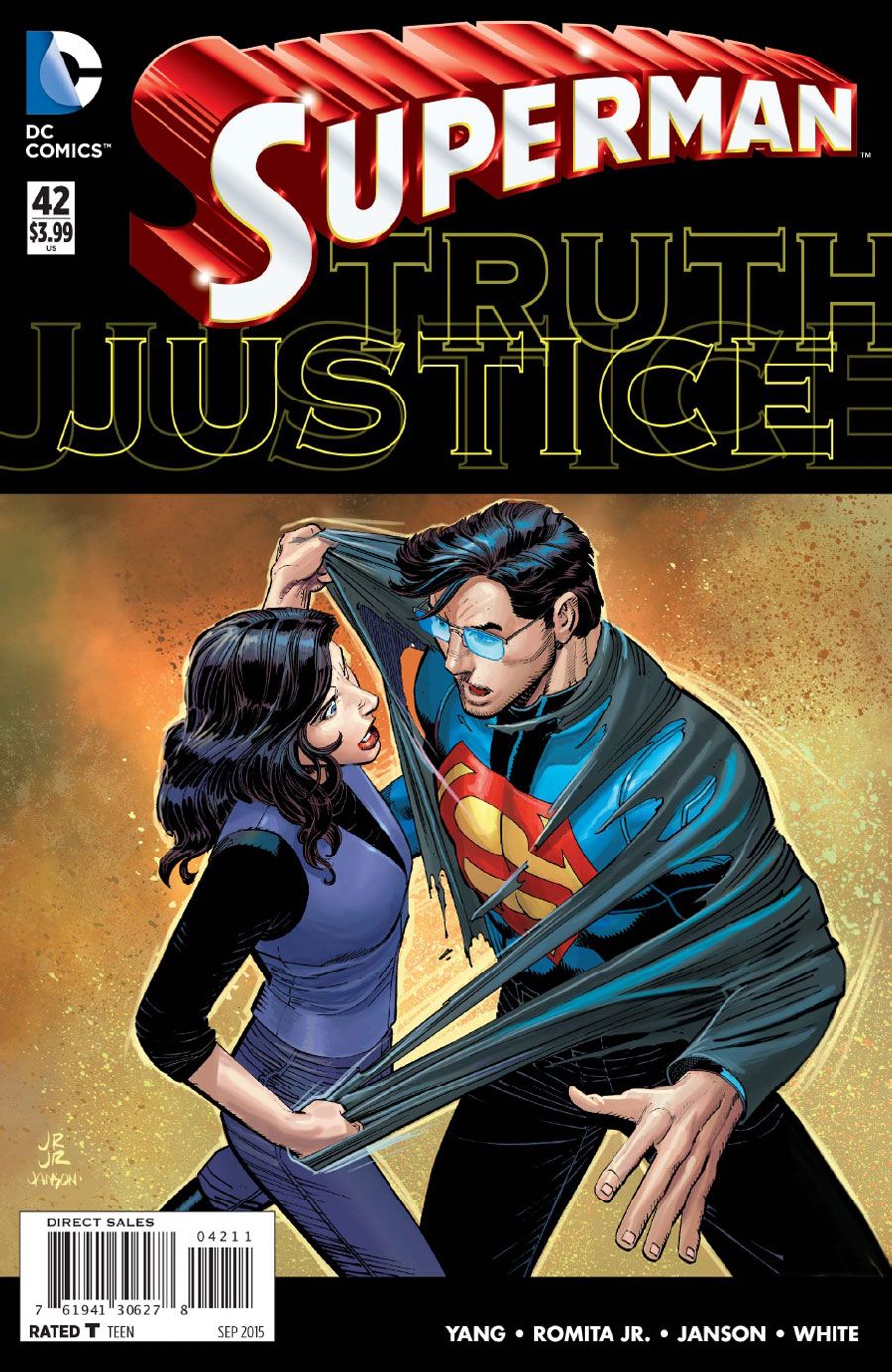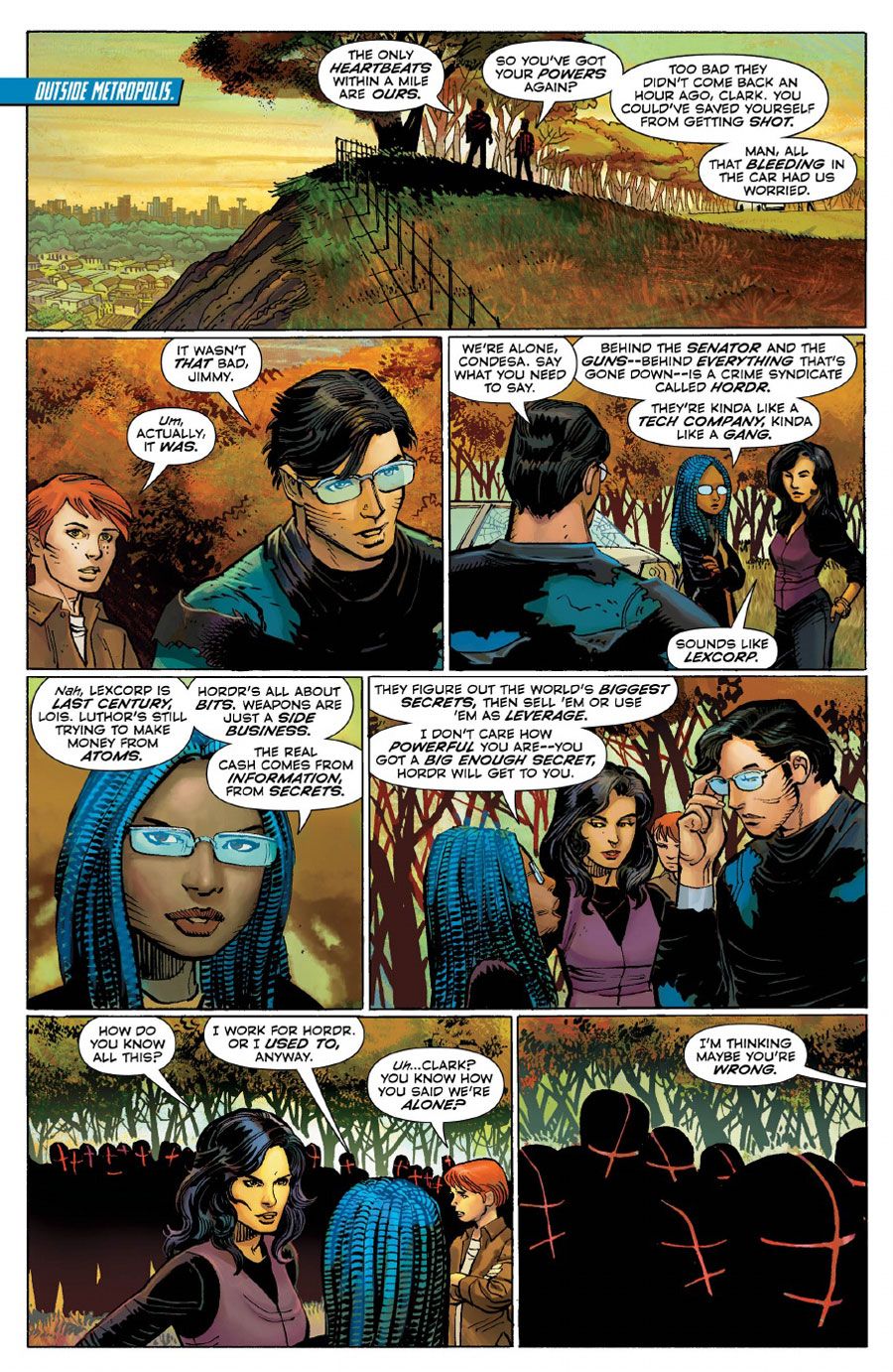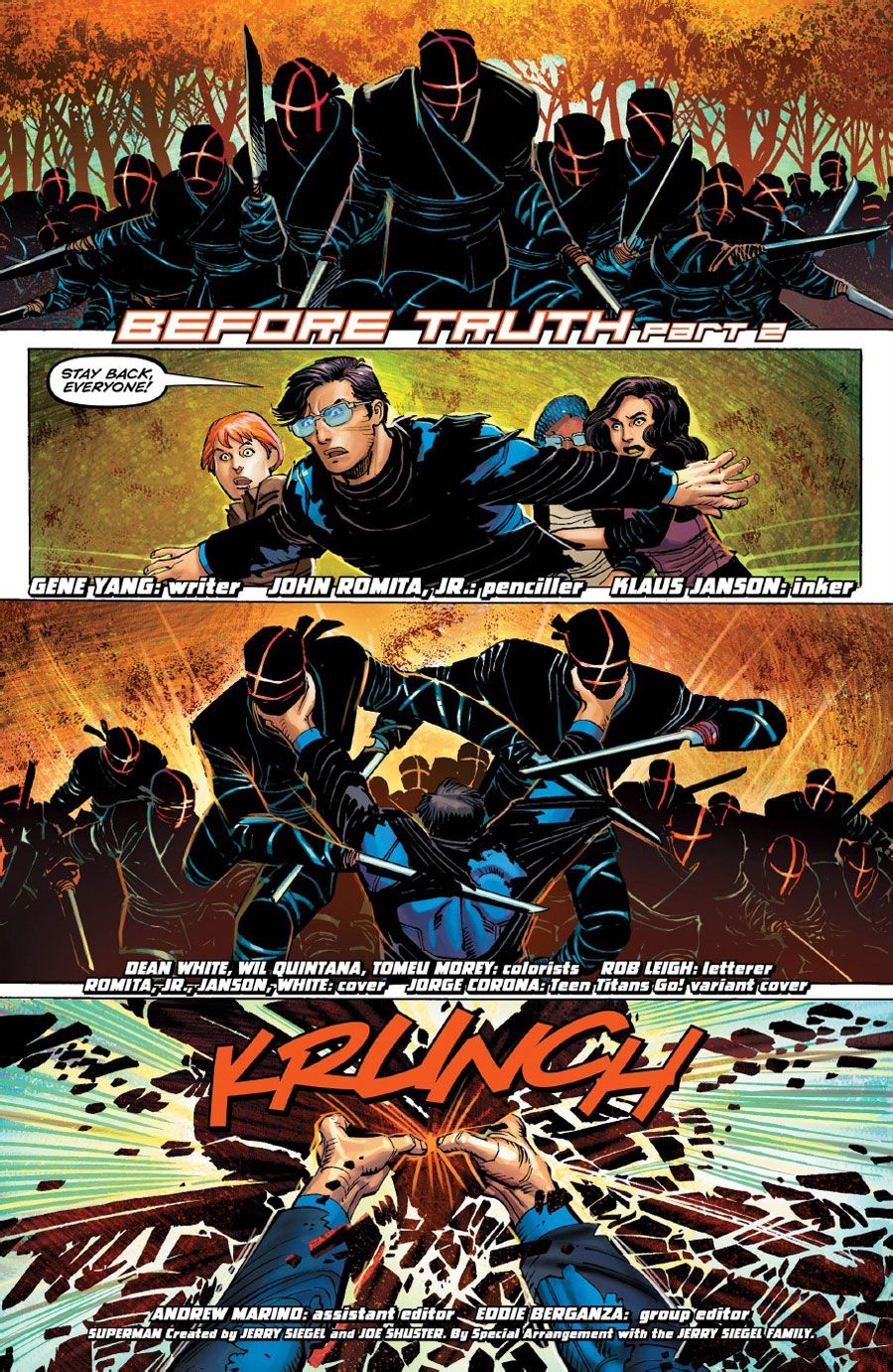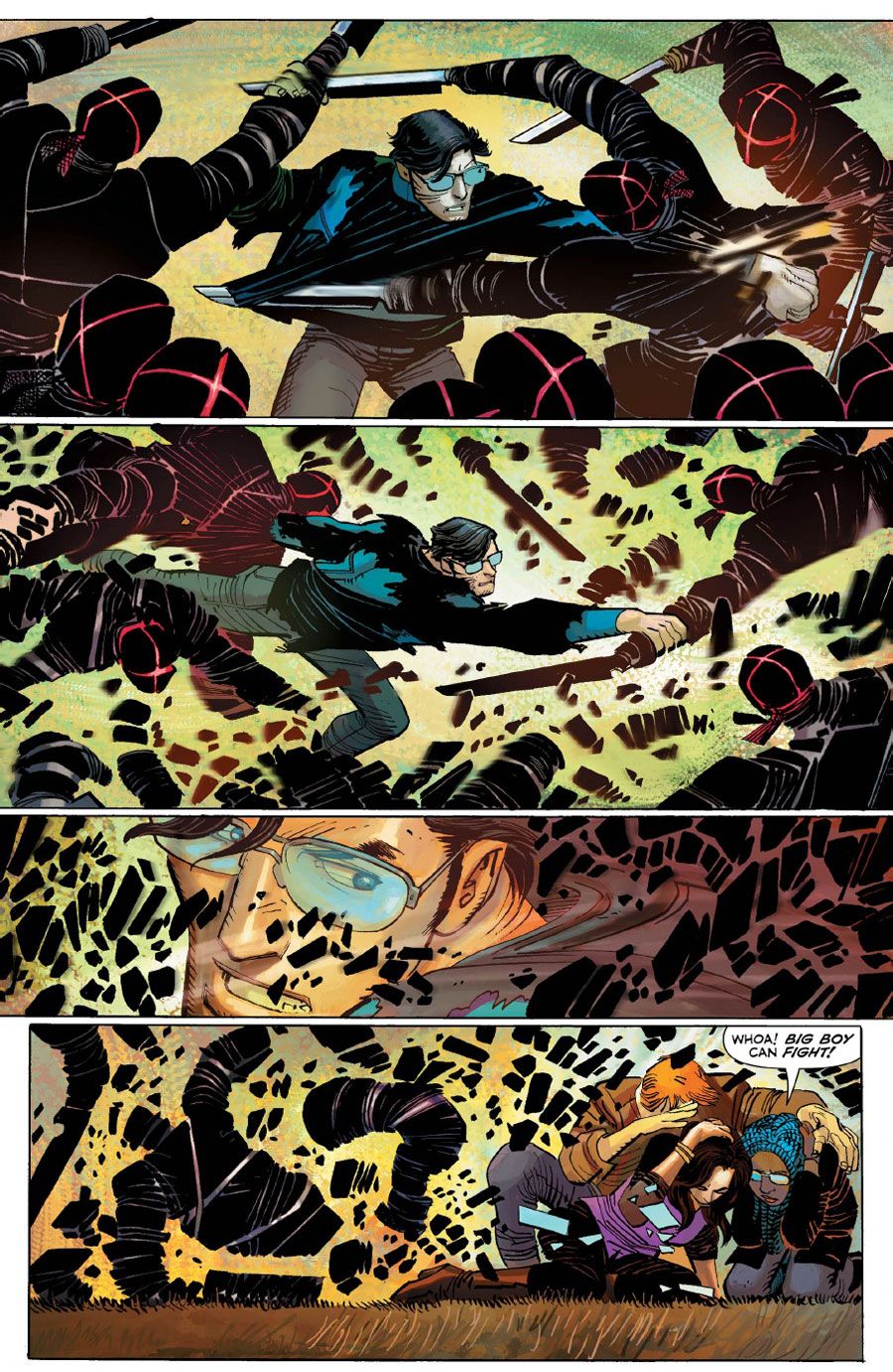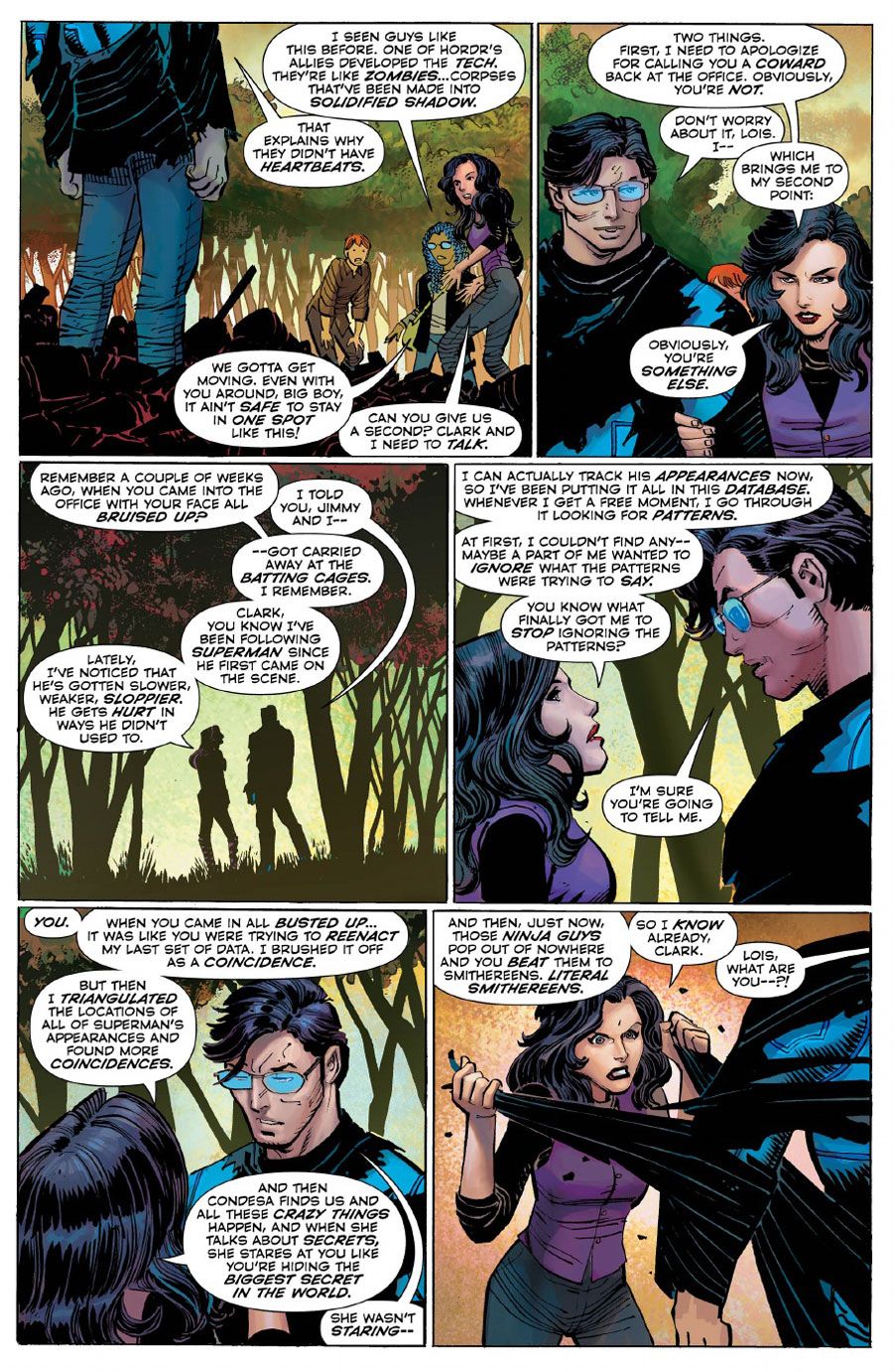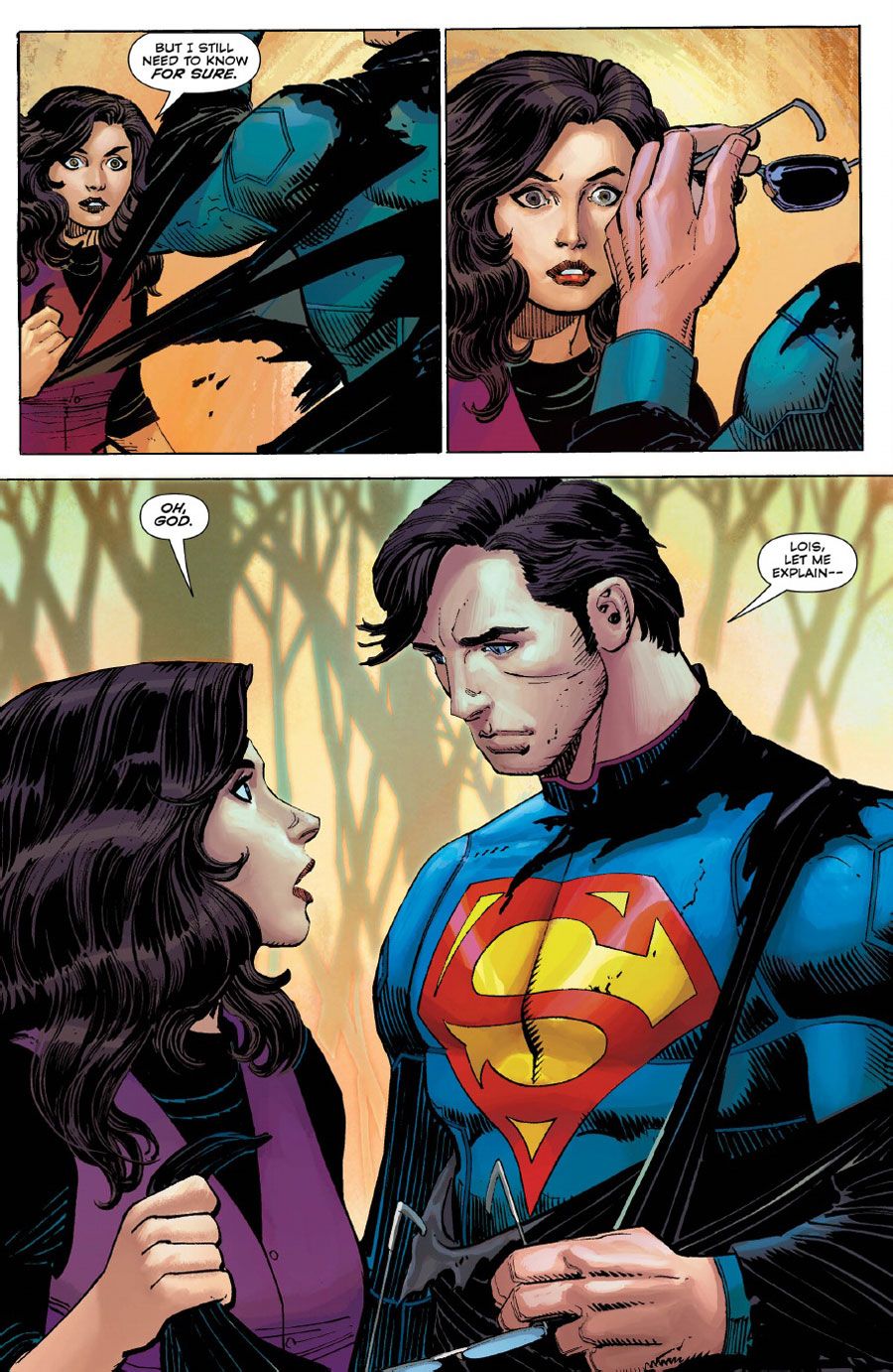SPOILER WARNING: This article contains major spoilers for "Superman" #42, on sale now.
As anyone who has read current issues of "Action Comics" or DC Comics' Free Comic Book Day 2015 issue knows by now, Superman's secret identity has gone public, with Clark Kent out in the open as the Man of Steel. What isn't yet known, however, is exactly how and why things got to this point -- and that's the story writer Gene Luen Yang and artist John Romita Jr. are telling in the "Superman" series.
In this week's "Superman" #42, Yang's second issue on the series, mysteries remain, though a much bigger piece of the puzzle is revealed -- including the moment where Lois Lane confronts Clark Kent that she has indeed figured out his secret, and revealing his costume just to be sure. The issue also includes the debut of a new villain, Hordr_Root (pronounced "hoarder root"), bringing a tech-inspired menace to the Superman mythos, using questions of privacy in the social media age to plague the 75-plus year-old superhero.
CBR News spoke in-depth with Yang about the issue, including how he approached the fateful scene between Clark and Lois, and his real-life Silicon Valley experiences that led to the creation of Hordr_Root. Yang also talked about working with Romita and making the transition from graphic novels like "American Born Chinese" and "Boxers & Saints" to writing "Superman," the longest-running and most famous comic book superhero in history -- which involved adjusting to the monthly schedule.
CBR News: Gene, "Superman" #42 had some big moments, headlined by Lois confronting Clark that she's figured out he's Superman -- as seen on the cover as well as inside, we see her ripping off his shirt to reveal the Superman costume. Of course, the reader knows that she knows at this point, but we haven't seen that moment until this issue. That's a big one -- not a story you get to tell every day, and an important scene between two very famous characters. What was it like for you on your end, putting together that sequence and giving it the weight that it merited?
Gene Luen Yang: I had a lot of help. I'm part of a larger Superman team -- there's an editor, Eddie Berganza, that oversees the whole thing. Superman's part of four different books, so early on, when I first came into DC, we had multiple meetings where we hashed it all out. I took a lot of what we talked about, and used it as fodder for this one scene. Like everything else with this character, it's intimidating. It's crazy intimidating. I think Lois just as iconic as Superman is at this point. To do that moment... If I think about it too much, I won't be able to continue writing. [Laughs] I have to just do it.
Lois a much more active character in this story than readers may have seen in a while -- how important was that to you, giving her a pivotal role in driving the story forward?
I think "active" is a great word to describe Lois. Lois historically, Lois from her very beginning, has always been active. The aspects of her personality, the aspects of who she is that we all know and love, those were in place from the beginning. As a way of prepping for the gig, I went back and I read a bunch of the early issues of "Action" and "Superman" -- she was just like that. She was a go-getter from the very beginning. It's just part of staying true to who she is. It's part of allowing the story to come out of her character.
There's also a new villain that we see in the issue -- "Hordr_Root." What can you say about his conception?
I grew up in the Silicon Valley. I still live in the Silicon Valley. A couple months ago, I had this friend who works in the privacy department at Facebook, and he invited me onto their campus to have lunch. [The campus is] nuts, dude! It's crazy. It's hard to believe that kind of thing exists in real life. I don't think Facebook or Google are evil -- I think some of the things they do might push the boundaries, but I don't think they, in and of themselves, are evil.
What I wanted to do is take the dark side of Silicon Valley, and make references to Silicon Valley culture, and combine them into this evil organization. Take all the evil aspects of Google and Apple and Facebook, and make it into an evil organization. The main character, Hordr_Root, the way I pitched him was as an "evil version of Mark Zuckerberg." I qualify that, because I personally don't believe that Mark Zuckerberg is actually evil, although some people disagree with me. [Laughs]
It's an interesting choice of villain for a Superman story, because readers are used to characters targeting Superman as a physical threat to him or the world at large, but this is a different dynamic. At what point did your idea connect as the right match for a Superman story?
Superman has always been called "The Man of Tomorrow." That's a nickname he's had for a long, long time. The reason he got that nickname is because, in the very beginning, he did embody American notions of the future. When he was created in the '30s, we tended to think of the future in terms of physical powers. We thought about flight, we thought about getting faster, we thought about getting stronger. That's what he is.
But now when we think about the future, we think more in terms of information. We think about how information is becoming more and more ubiquitous, how it's becoming less and less controllable. So I wanted to take an older version of the future, and pin it up against a newer version of the future, and see how things play out.
Also in this issue, the new solar flare power that was introduced by Geoff Johns and John Romita Jr. a few months back plays a big part. That's such a new addition to Superman -- how do you like that new element to the character, and getting to use it as a major component to this story?
I think it's interesting. I think it's a really interesting notion. The thing that I find most interesting is, this is the way for the most powerful person on the planet to lose his power. And what happens? What's the consequence of that? I think Geoff Johns explored that a little bit -- what it means for him to lose his powers in the context of his friendship with Jimmy. John Romita Jr. wrote and drew "Superman" #40, and he basically explored what it means for Clark to lose his power in terms of his experience of society, and his experience of everyday life.
For me, it's more in the context of hero-ing. For a hero to lose his powers, what's going to happen? It seems like somebody evil might figure out a way of taking those powers from him when he loses them.
One more specific point from the issue -- we see the Toymaster, Hiro Okamura, in a scene, who's recently appeared in "Batman/Superman." what inspired you to use him here?
I like him. I like who he is, I like the way Greg [Pak]'s constructed him. Superman needed a tech ally -- he was fighting a tech villain, he needed a tech ally, at least for a moment. That's what Hiro is.
Since the two of you are writing the main Superman books, are you and Greg talking a lot on the phone, over email, keeping tabs on each other's ideas?
We text a lot. Not just about Superman, we also text about Jeremy Lin quite a bit. [Laughs]
I know Greg's a big fan. I think any Asian-American who likes sports at least a little bit is likely still excited and hopeful about him.
Exactly. He can fail for the rest of his career, but I will still be a fan of his.
Also wanted to talk to you about this experience as a whole so far -- you've been working on Superman for at least a few months behind the scenes, with your second issue out this week. It's your first monthly superhero comic -- you're known mostly for graphic novels, and now you're working on the biggest superhero of all time. What has this been like for you?
It's been amazing, but it's also been incredibly, incredibly nerve-wracking. Part of it is the fact that I'm a lifelong superhero fan, so it's the fulfillment of a dream. Part of it is exactly what you said -- I'm writing the character that established the genre. This is the character from which all other superheroes come from. That's incredibly intimidating. It still feels intimating!
Also, the production schedule's crazy! With graphic novels, I finish a book, and then I turn it in, it goes through copy edits -- like a year later, it comes out on the shelf. Whereas this, it's nuts. The production schedule is just nuts. I have a deeper appreciation for the people who work in mostly superhero comics for their entire career. I think they're just awesome at handling stress. I think that's what you have to be.
Curious about your approach -- so much of your graphic novel work is very personal, and Superman is a character, more than almost any other, kind of belongs to everybody. Not that superhero stories can't be personal, and not that your graphic novels aren't relatable to large audiences, but in terms of writing, how different of a mindset is it for you to shift into with "Superman"?
What I had to do when I came into the project was look for that overlap. Superman is such an old character with such a long legacy that he's gone through these different eras, and he's gone through different writers and artists that have emphasized different parts of him. He's actually a pretty flexible character. His personality isn't just one way throughout his entire history. It changes. Even this whole dichotomy of whether he's more Superman or Clark Kent, that's a pendulum that swings back and forth throughout his history.
For me, the parts of his history that resonate the most for me are the immigrant parts. Like all the major superheroes, he was created by these children of Jewish immigrants. I don't know if they did it consciously or not, but they implanted their own experience into who he is. Most immigrants' kids grow up with two different names -- one at home and one at school. That's certainly true of me. Most of us grow up under two different sets of expectations, within two different cultures. Superman is all of those things. That's where I found my first initial connection point into his character.
You mentioned veterans of superhero comics, and here you're working with John Romita Jr., one of the most prolific and acclaimed in the genre. What's it been like collaborating with him on this book, and working with such an iconic superhero artist?
It's awesome. Dude, that guy's work ethic -- I've never seen anything like it. It's stunning. His work ethic is just shocking. It makes me feel slightly bad about myself. [Laughs]
But I grew up reading superhero comics. I was a fan of John Romita Jr.'s. I remember in high school, I lined up to get his autograph at local comic book conventions. To go from that to actually getting to work with him -- and getting into a situation where he actually knows my name! It's amazing! It's awesome. It's crazy.
I think he's considered an icon for a reason. It's not just his work ethic. It's also the way he approaches story. One of the things I think he does best is choreograph action. I have this theory that if he were not a comic book artist, he would have gone into Hollywood and been a fight choreographer. He's just really good at it. He's really good at framing it, he's really good at setting it up, he's really good at making you feel the punches and the weight of the action. That's something I'm trying to learn from him -- something I want to take into the other stories that I do.
Looking towards next month -- anything you can tease for the next issue coming up?
We've already revealed in the Free Comic Book Day issue that Lois will reveal Superman's secret identity. We're going to actually show that happen -- within the next few issues, we're going to show why, and we're going to show the ramifications of that happening.
"Superman" #42 is on sale now.

